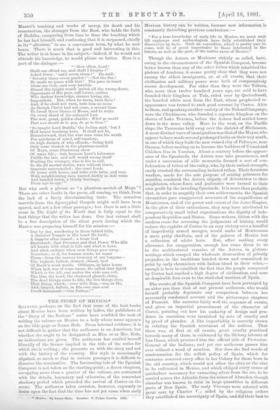THE STORY OF MEXICO.*
RELYING, perhaps, on the fact that some of the best books about Mexico have been written by ladies, the publishers of the "Story of the Nations" series have confided the task of writing the volume on Mexico to a lady whose name appears on the title-page as Susan Hale. From internal evidence, it is not difficult to gather that the authoress is an American, but whether she ought to be designated as Miss or as Mrs. Hale, no indications are given. The authoress has availed-herself liberally of the license implied in the title of the series for which she is writing ; she presents us with the story and not with the history of the country. Her style is occasionally slipshod, so much so that in certain passages it is difficult to discover the nominative. The fascinating tale of the Spanish Conquest is not taken as the starting-point; a dozen chapters, occupying more than a quarter of the volume, are concerned with the details, legendary and otherwise, of the somewhat shadowy period which preceded the arrival of Cortez on the scene. The authoress takes occasion, however, expressly to insist upon the fact that the time has not yet come when early • Ironic°. By Susan Hale. London: T. Fisher Unwin. 1891.
Mexican history can be written, because new information is constantly disturbing previous conclusions :-
" For a true knowledge of early life in Mexico, we must wait till explorers and archeologists have fully established their discoveries by facts. Such an exposition, which is pretty sure to come, will bo of great importance to thoso interested in the future, as well as the past, of the native races of Mexico."
Though the Aztecs, or Mexicans strictly so called, have, owing to the circumstances of the Spanish Conquest, become better known than any of the other tribes which inhabited the plateau of Anahuac, it seems pretty clear that they were not among the oldest immigrants, or, at all events, that their civilisation and military power were both of comparatively recent development. Far older than they were the Toltecs, who, more than twelve hundred years ago, are said to have founded their kingdom at Tula, ruled over by Quetzalcoatl, the bearded white man from the East, whose prophesied re- appearance was turned to such good account by Cortez. Akin to them, and speaking another variety of the Nahuatl language, were the Chichimeos, who founded a separate kingdom on the shores of Lake Texcuco, before the Aztecs had settled lower down in the same valley. More to the west, on the Pacific slope, the Taraseans held sway over the district of Michoacan.
A more distinct wave of immigration was that of the Mayas, who
to have made several prolonged halts on their way south, in one of which they built the now ruined city of Palenque, near Oaxaca, before moving on to become the builders of Uxmal and Chichen Itza in Yucatan. About a century before the appear- ance of the Spaniards, the Aztecs rose into prominence, and under a succession of able monarchs formed a' sort of con- federation of tribes of the valley, who, by their united strength, easily crushed the surrounding isolated tribes. Their ferocious warfare, made for the sole purpose of seizing prisoners for• sacrifice, rendered the Aztecs objects of detestation to their neighbours, whose fears and jealousies were turned to their own profit by the invading Spaniards. It is more than probable that, in order to magnify their own achievements, the Spanish chroniclers gave exaggerated accounts of the magnificence of Montezuma, and of the power and extent of the Aztec Empire, In the glow of their enthusiasm, they may have attributed to comparatively small tribal organisations the dignity of inde- pendent Republics and States. Some writers, bitten with the modern craze for reversing the judgments of history, would reduce the exploits of Cortez to an easy victory over a handful of imperfectly armed savages, would make of Montezuma. a mere petty chieftain, and of the palaces of Mexico but a collection of adobe huts. But, after making every allowance for exaggeration, enough has come down to us. in. the architectural remains of the Aztecs, in picture- writings which escaped the wholesale destruction of priestly prejudice, in the traditions handed down and committed to print by early chroniclers with Indian blood in their veins,— enough is here to establish the fact that the people conquered by Cortez had reached a high degree of civilisation, and were no despicable foes even to the steel-clad warriors of Spain.
The events of the Spanish Conquest have been portrayed by an abler pen than that of our present authoress, who would herself probably deprecate any comparison between her necessarily condensed account and the picturesque chapters of Prescott. She narrates fairly well the sequence of events, and gives an impartial presentment of the character of Cortez, pointing out how his audacity of design and pru- dence in execution were tarnished by acts of cruelty and by greed of plunder. A like impartiality is scarcely shown in relating the Spanish treatment of the natives. That there was, at first at all events, great cruelty practised towards many of these, is evidenced by the lifelong labours of Las Casas, which procured him the official title of Protector- General of the Indians; and yet our authoress passes him over without a word of mention. Nor does she find words of condemnation for the selfish policy of Spain, which for centuries reserved every office in her Colony for those born in the old country, which would not allow the olive or the vine to be cultivated in Mexico, and which obliged every ounce of quicksilver necessary for extracting silver from the ore, to be carried across the Atlantic from the mines of Almaden, though cinnabar was known to exist in large quantities in different parts of New Spain. The early Viceroys were selected with great care by Charles V.; aided by the religious orders they established the sovereignty of Spain, and didtheir best to check abuses. Philip II. had not the interest in the Colony which his father derived from his personal acquaintance with Cortez ; the mines of Peru had become more productive than those of Mexico, and the latter was in consequence somewhat neglected, while the "Viceroys ceased to be selected with the
same care. Philip IL introduced the Inquisition, but, happily, -exempted the Indians from its jurisdiction ; heretics of European extraction were not sufficiently plentiful to enable the Holy Office to reach the point that it did in Old Spain. After the death of Philip II., the greatness of Spain declined rapidly, and the Colonies were left more and more to them- selves, though many of the Viceroys, considering their lights, evinced a genuine interest in the country which they were sent to govern. In the early years of the present century, Humboldt spent some months in Mexico, and, in. addition to his scientific observations, left a good picture of the condition of the country towards the close of the Viceregal period. The era of revolutions in Mexico was begun. by a genuine move- ment among the people themselves against bad government ; the patriot priests Hidalgo and Morelos, who successively raised the cry of independence, were crushed by the regular troops of Spain ; but their ideas germinated, and a few years later the commander of the Spanish forces, Iturbide, set the evil example of pronouncing " for the other side, and, heading the revolution, got himself proclaimed Emperor in 1822. After a reign of a few months, he was expelled and a Republic proclaimed, his chief opponent being Santa Anna, who, from that time forward, was mixed up with every event in Mexico -for the next fifty years. Santa Anna was five times President himself, and was the means of deposing about twenty rulers, dying quietly, after his stormy career, in the city of Mexico in 1876, Our authoress admits that the war with the United States, which resulted in their acquiring Texas and California, was not creditable to her countrymen, and that, in spite of the inferiority of their armament, the Mexicans fought bravely ; she seems a little ashamed at the strong Power exacting indemnity from the weaker one, though perhaps, in the long- run, the interests of the higher civilisation have justified the event to the annexed territories themselves. The American war struck the first blow at the power of the Church in Mexico, as the taxation of property in mortmain was then first suggested. In 1851, the change of Presidency was, for the first time in the history of the Republic, effected without violence. Though this happy result was not yet the normal 'rule, Mexico never relapsed into the aimless anarchy of her early days of independence ; if there was war henceforth, it was for definite objects of reform. The account given of the French intervention and the Empire of Maximilian is not .altogether trustworthy in some particulars. The pretentious idea put forward by Napoleon III. to justify the intervention was, that it was undertaken to oppose the Latin race to the invasion of Anglo-Saxons in the New World: the real main- spring was a discreditable financial transaction, by which Morny and others about the Emperor bought up the worthless -claims of a Swiss banker named Jecker, and then got the Imperial Government to press them as French claims. The authoress makes no mention of the Convention of the Soledad, by which, for climatic reasons, the troops of the three Powers were admitted through the mountain passes on condition of their withdrawing if the negotiations came to nothing. The negotiations did fall through, and the Spanish and English troops withdrew, but the French deliberately kept their vantage-ground and marched up-country. A serious mis- statement occurs on page 852, to the effect that Maximilian .accepted the crown on the condition that France and England should. sustain him with their guarantee, moral and material, and that England withdrew early from the Alliance. England never gave any guarantee whatever to Maximilian, and, in. fact, withdrew from the triple alliance the moment that his candidature, was proposed by the French. The authoress is right in regarding Maximilian as a dreamer, but does not give him credit for his Liberal ideas ; he was driven by events into the arms of the Clerical party, but his own desire always was to put himself at the head of the Liberals ; it must be remembered that he had been the Liberal Governor of Lombardo-Venetia, the only Austrian who ever attained any popularity among Italians. When Napoleon withdrew his army, it is quite true that he urged Maximilian to abdicate ; but our authoress is wrong in saying
that he was slow to admit the idea. He fully entertained it, and, in fact, at his request, a British gunboat was kept at Vera Cruz for a month, with her fires banked, ready to convey him to Europe if only he could obtain guarantees for the safety of those Mexicans who had supported him. Failing in this, he deliberately abandoned his own chance of safety, and elected to remain in his adopted country after the departure of the French. Bazaine was anything but a true friend to him, as the authoress maintains ; he was plotting for his own hand, as he afterwards did at Metz, and, when leaving the country, lie sold guns and military stores to the Liberals to be used against Maximilian. The portrait given of Maximilian bears little resemblance to him as he was in Mexico ; it represents him ten years younger as an Austrian Admiral. Considering the low price of the book, it is fairly well illustrated, and it further contains a map and a good index.



































 Previous page
Previous page